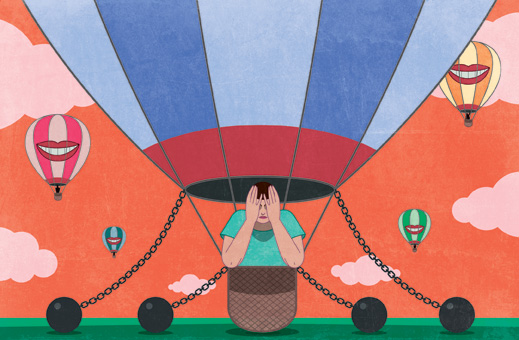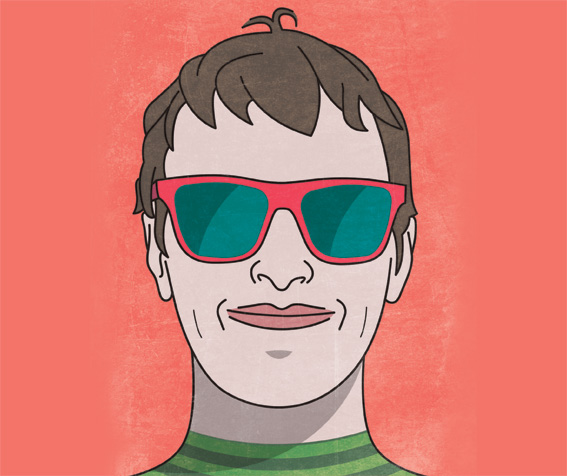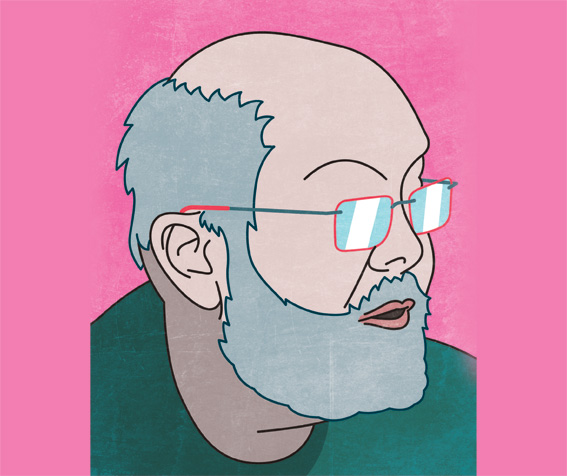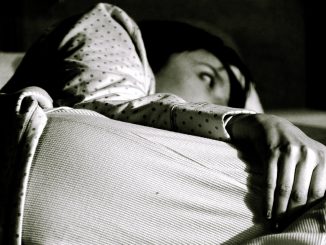Cancer-related fatigue affects many people, before, during and after treatment. It can have a seriously debilitating impact on lives, but effective interventions have so far proved hard to find. Sophie Fessl explores what might be causing the condition, and asks healthcare providers and patients about how they manage it.
“Before cancer, I did not know fatigue. Now, I live my life at half energy and am very tired and depressed on a daily basis. My healthcare providers just told me to get used to my new life, and I found myself alone to deal with new problems.”
Fatigue, the mental and physical exhaustion described here in the words of a woman with breast cancer, is one of the most common side effects of cancer, and affects people before, during and after cancer treatment. Although many people with cancer suffer from fatigue, the causes are poorly understood, and there is no drug to effectively treat it.
Fatigue may affect anyone at any stage of the disease, any type of cancer, treated by any modality. And while fatigue usually improves after treatment, in around one third of cases fatigue persists for months or years, and may even turn into a chronic condition, with devastating implications for the person’s quality of life.
In a study of people with cancer who had received chemotherapy, almost all who reported fatigue felt that it prevented normal life (The Oncologist 2000, 5:353–360). A more recent study found that many feel that their doctors either fail to grasp the seriousness of the problem, or if they grasp it, they still had no effective treatment or advice to offer (Support Care Cancer 2011, 19:363).
The experience of Paul Senior, who has been living with advanced, incurable prostate cancer for the past six years, is a case in point. “On a good day, I can go out, read a book. On a bad day, I want to do nothing. I might watch a bit of TV, but that is all I’m fit for. The worst for me is brain fog, or ‘muzzy headedness’ as I describe it. As someone who was an academic for most of my life, the fact that sometimes I can’t think, act or read is frustrating.”

Healthcare providers are aware of the problem, he says, “but find it rather more difficult to offer solutions.”
For Natalija Sintler, who is on hormone therapy for breast cancer, fatigue affects both work and family life: “I had to reduce my daily working hours from eight hours to four hours. But these four hours leave me as tired as an eight- or ten-hour day left me before. When I get home, I crave rest in the middle of the day, which I didn’t before. My lack of energy affects my partnership, motherhood, friendship and my job.”
Natalija sought help from her doctors, and was not impressed by their response. “[They] all offered treatments focused on the cancer only. They left me without answers on how to deal with my lack of energy, and just told me to get used to my new life. I wish my doctor had listened when I told her about my fatigue, but she didn’t have time. And at some point, you stop asking and find other sources of help.”
So how can healthcare providers do better to manage this common, and often severe, side effect of cancer and cancer treatment, and what can patients themselves do to alleviate the impact of fatigue on their lives?
“On a good day I can go out, read a book. On a bad day I want to do nothing”
Dave Balachandran, director of the Sleep Center at the MD Anderson Cancer Center in Houston, argues that healthcare providers’ attitude to cancer-related fatigue (CRF) now is where attitudes towards pain were a decade ago: “Ten to fifteen years ago, cancer patients were told to just accept pain, because we can’t do much about it. But there has been a huge change in mindset. We now ask patients routinely about pain, and rightly so. With fatigue right now, we are at a point where physicians tell patients to just accept CRF as a chronic illness. But this is where we specialists come in. We say that, yes, fatigue is common with cancer, but there is more to it, and we need to strategise on treatment modalities. We don’t just draw up our hands and say ‘sorry, you just have to deal with it’, especially in the long term.”
What causes cancer-related fatigue?
Balachandran emphasises the importance of distinguishing cancer-related fatigue from the problem of sleep disruption. “Sleepiness is defined and measured as the tendency to fall asleep. In the fatigue clinic, we offer patients with fatigue the option to objectively quantify their tendency to fall asleep. If they score highly, we refer them to the sleep centre, where we test sleep quality. So we tease out the sleepiness component, which we can indeed treat. But people with fatigue don’t necessarily want to sleep. And while there are validated scales to measure fatigue, the mental and physical exhaustion that comes with it is hard to quantify.”
Natalija Sintler, treated for breast cancer “I wish my doctor had listened”
“I received chemotherapy for breast cancer last August, and radiotherapy in October. Now I receive hormone therapy. With the therapy, fatigue arrived. My work leaves me very tired and, when I get home, I crave rest. But I have an eleven-year-old daughter, so I can’t just take naps when I want to. My fatigue has changed me. My family and friends couldn’t adapt to the new me, and frankly, neither could I.
“My doctors operated, poisoned, and burnt the tumour out of my body, and when treatment was finished, it was like ‘Mission completed!’. Two months after the end of treatment, my doctor sent me back to work. When I told her about my fatigue, she prolonged my sick leave by one month.
“Nobody told me where to find help, or offered ways to deal with my lack of energy, so I searched for support. Psychotherapy has helped me to cope with my problems. I also practice yoga on a daily basis, which helps me to feel better in my body. I spend more time in nature, walking, jogging, and hiking. As I walk, slowly new energy arrives. Mindfulness-based stress reduction has helped to calm my mind, sleep better, and cope with stress. I now accept times of fatigue as time for rest.
“Europa Donna has been a great support community. I feel that I can only get useful advice from someone who has had the same experience. Stories by others bring on a new perspective, and I realise now that it is more about the quality of what
I do than about the quantity.”
At a symptom level, we know that fatigue is associated with a variety of conditions connected with cancer, including anaemia, deconditioning, pain, depression, and anxiety, says Balachandran. Nutrition is also a big issue for patients with cancer, he adds. “But also cancer treatment itself, especially immunotherapy, causes fatigue. And co-morbid illnesses, such as liver and kidney disease or diabetes also contribute. When we see what contributes to fatigue in a patient, we can strategise treatment.”
What is going on at the biological level is less well understood, however. A recent review of current controversies in the pathophysiology of cancer-related fatigue argues that inflammation probably plays a major role (Support Care Cancer 2018, 26:3353–64). Cytokines convey to the brain that an infection has occurred, and induce feelings of ‘sickness’. These feelings lead to changes in behaviour, i.e. ‘sickness behaviour’, such as tiredness, exhaustion, depression, and loss of appetite, which are seen as part of a body’s normal adaptive response to infection, enabling the body to prioritise clearing the pathogens.
“Cytokines play a role in cancer, and the same changes to the immune system occur,” explains Balachandran, “we see an increase in cytokines such as TNFα and γ-interferon. ‘Sickness behaviour’ is similar to cancer symptoms such as fatigue.” However, there is more to cancer-related fatigue than just the immune system, he says.
Other mechanisms that may be at play include the disruption of the hypothalamic-pituitary-adrenal axis, which normally regulates the release of the hormone cortisol in response to stress. Cancer, or its treatments, may cause endocrine changes that induce fatigue. Other hypotheses, which may not be mutually exclusive, but could well be connected or act in concert, propose that the dysregulation of the circadian rhythm and of serotonin, as well as activation of the vagal afferent nerve, contribute to fatigue.
For Ollie Minton, Macmillan Consultant and honorary senior lecturer in palliative medicine at St. George’s University Hospital in London, who has co-authored a Cochrane Collaboration review on pharmacological treatments for cancer-related fatigue, this lack of understanding of the causes is to blame for the difficulty in treating the condition. “Until we know what is causing cancer-related fatigue, all we have to treat CRF are non-specific interventions.”
Ask and tell
In the US, the National Comprehensive Cancer Network (NCCN) has been publishing annually updated guidelines for treating cancer-related fatigue since 2000. These offer guidance for screening as well as recommendations for interventions. Ann Berger, Professor and Dorothy Hodges Olson Endowed Chair in Nursing at the University of Nebraska, Omaha, leads the panel tasked with the annual updates. For her, the NCCN guidelines are a step in the right direction: “Interventions for cancer-related fatigue have been tested for the past 25 years. We have come a long way since then, but there is still a long way to go. Our goal in treating CRF according to evidence-based guidelines is of course to help patients have a good quality of life. If a patient suffers from severe fatigue, we may be able to bring it to a moderate level, so that they continue cancer treatment and enjoy life.”
The crucial first step is identifying when fatigue is a problem, says Berger. “Patients need to report fatigue, but they need to know that fatigue is not just ‘something that comes with cancer and treatment’, which they have to accept. And nurses need to ask about, and need to record, fatigue levels. Patients bring up pain, we want people to bring up fatigue as well.”
When a cancer patient reports fatigue at a moderate to severe level, the NCCN guidelines, which are also used in the UK, strongly recommend physical activity as intervention – once other contributing factors like pain, anaemia, or nutrition are ruled out or treated. This is a departure from previous practice, says Berger: “Oncology nurses used to teach cancer patients to rest and not assume their daily activities. Now, guidelines recommend that cancer patients on treatment stay as active as they were before treatment.”
For patients both on active treatment and post-treatment, recommendations are to take 150 minutes of moderate-intensity exercise, broken into chunks, such as walking for 30 minutes on five days a week. “This is the most general intervention that seems to work for all patients in alleviating cancer-related fatigue,” says Berger. A Cochrane Systematic Review, published in 2012, supports that assertion, concluding that aerobic exercise is beneficial for people with cancer-related fatigue.
Reality check
How realistic is the expectation that patients on cancer treatment comply with such a recommendation? JiaHui Gan, senior physiotherapist at Milford Hospital, under the Royal Surrey County Hospital, says that even in-patients can reach such a level of activity: “Moderate-intensity exercise means that the person should feel that completing the exercise or activity is ‘somewhat hard to hard’, but not ‘too hard’.
“Nurses need to ask about and record fatigue levels. Patients bring up pain, we want people to bring up fatigue as well”
“In a healthy person, or after treatment, that would mean fast walking, cycling or swimming. In an in-patient or out-patient setting, we assess the complexity of CRF and how much effort a patient needs to put in to reach the recommended ‘feeling’. And this could be as basic as engaging in activities of daily living, like getting up from bed, walking around the room or the ward, or to the hospital restaurant, if a patient has severe fatigue and is deconditioned. If a patient does this daily, they can easily achieve the recommended exercise protocol of 150 minutes a week.”
Replacing that half-hour walk with a pill is not yet possible. While several pharmacological options for treating fatigue have been trialled, none have given oncologists a ‘cure-for-all’. Pharmacological interventions may help in some cases, says Minton: “Ritalin, for example, may be given to patients with advanced cancers. But on the small evidence base for it, I’m not confident to prescribe it routinely. We do not have any drugs that we can routinely recommend.”
The evidence for complementary medicine is also thin: “Vitamins and ginseng have been tested, but trials haven’t shown anything. Ginseng for CRF was tested in small
trials that were not terribly effective. It may be that there is an active ingredient in ginseng, but not knowing what risks all sorts of interactions.” Nevertheless, Minton argues that eventually, drugs could complement the toolkit for treating fatigue: “Ideally, we would like to give fatigued patients something that makes them feel better and more active. Then we would encourage them to exercise.”
Mateja Veber, treated for breast cancer “Talking helps”
“After working for four hours, I go to sleep immediately and stay at home in the afternoon.
I cannot play with my two daughters anymore, I cannot work. My life is not the same as before.“Fatigue is a big problem for me. My legs hurt, my muscles and bones hurt. But my oncologist and personal doctor help me, and I receive psychological help.
“Talking with them and meditation help me.
“I would recommend to other patients who suffer from fatigue to talk a lot, especially to friends who have the same cancer.”
Empowering patients to manage fatigue
Balancing exercise with rest is important for fatigued patients especially on days when fatigue is strong, emphasises Gan. She also recommends alternative ways of increasing activity levels, including yoga, tai-chi, and meditation, so long as the patient enjoys doing them – as many do (see for instance the testimonies of Natalija Sintler and Sally Jenkins). “Yoga and mindfulness-based stress reduction are evidence-based interventions for CRF patients on active treatment and post treatment,” Berger agrees. “Mindfulness can calm the emotional status and distress, while psycho-social interventions such as cognitive behavioural therapy and psycho-education are also good for treating fatigue.”
Sally Jenkins, living with neuroendocrine cancer “Fatigue is both physical and psychological”
“The effects of fatigue are quite profound. Previously, when I was tired, I’d just grit my teeth, keep on going, and get rest once it was possible. But if I take this approach with cancer-related fatigue, I feel very ill and have to stay in bed for two days to recover. I cannot be spontaneous anymore, I have to plan when and what I’ll do. But if the tumours say ‘no, you are too tired’, I have to ditch my plans. The physical fatigue controls you.
“Fatigue rules my life. Having a long-term condition that will never be cured leaves us NET [neuroendocrine tumours] patients not only with the physical effects from therapy and the tumour burden, but also with a psychological fatigue. Psychological support is necessary to be able to accept the situation and maximise quality of life – to enjoy the good things and not regret what had to be given up.
“We now have a specialised NET service in south Wales, which is absolutely wonderful. I feel very well cared for. But before, without a dedicated service, fatigue was not a priority. When I mentioned it, I met an attitude of ‘oh well, it’s just part of the condition’. As a NET patient, you don’t look ill, so people might think that you are simply lazy, and this attitude extended to some healthcare providers.
“I know now how to manage my physical and psychological fatigue. I’ve found yoga extremely useful as it allows me to work within my limits. And my yoga teacher is very understanding when I fall asleep in class – they put a blanket over me, I snooze for ten minutes, and then continue with the exercises. I couldn’t do that in an aerobics class! Personally, I recommend recognising your own limits, then accepting and working within them. This approach allows me to maintain a reasonable quality of life, but it is not the same quality of life as before the diagnosis.”
These approaches are helping Sintler: “I practice yoga on a daily basis, which helps me to feel better in my body. I spend more time in nature, walking, jogging, and hiking. As I walk, slowly new energy arrives. Mindfulness-based stress reduction has helped to calm my mind, sleep better, and cope with stress. I now accept times of fatigue as time for rest.”
Zuzana Ondrusova, a psychologist practising in Slovakia, seeks to help patients find their own coping strategies. “First, patients need to know what is going on with their fatigue, and why there is no easy way to help them with a pill. Then I try to lead my patients to find where to put this condition in their lives. But they have to find themselves what fits them. I hear from some patients that they need to be more careful, that they need slightly more time for doing things. Dealing with fatigue is also about priorities, taking yourself seriously and fulfilling the needs of your own body and mind.”
While cognitive therapy and behavioural therapy have proven benefits for patients with cancer-related fatigue, and are recommended by the NCCN, the need for therapy often exceeds the availability of qualified therapists.
Clinical psychologist Bram Kuiper turned to digital technology to address this gap. The former head of the Centre for Psycho-Oncology at the Helen Dowling Institute, in the Netherlands, founded a social enterprise ‘Tired of Cancer’, which developed the ‘Untire’ app to scale up cognitive behavioural therapy and mindfulness-based cognitive therapy.
Paul Senior, living with prostate cancer “Brain fog is the hardest”
“I’ve been living with cancer, and cancer treatment, for over six years. Fatigue for me is not constant: it sometimes peaks, and then it weakens again. What affects me the most is the brain fog. Sometimes, I cannot pick up a book without it feeling like a strain – I can’t focus, can’t concentrate. I also experience tiredness, sleep disturbances and anxiety.
“My healthcare providers are aware of the problem of fatigue, but I think they find it rather more difficult to offer solutions. They listen to me and provide advice, but there is no easy solution. I’m also not pushing this aspect too much. At my appointments, I’m most anxious about the progress of my disease and most interested that my doctors get the treatment of my cancer as right as they can.
“Fatigue has just become part of my life, part of me now. I deal with it myself, and with the help of nurses, friends and the Prostate Cancer UK online community. Peer support is invaluable, as they are extremely knowledgeable from their own experience.
“I struggle with anxiety. I try to identify the source of anxiety and avoid it, and if I cannot avoid it, work through it by talking with my friends and with the help of mindfulness techniques. Mindfulness exercises help to calm my anxiety down, I feel better since using them.”
“Untire is a self-management tool for patients with cancer-related fatigue,” says Kuiper. “Everybody has his own journey, so we do not know the specific reason why any one patient is and stays fatigued. We give patients the tools to figure it out, including simple education about fatigue, recommendations for physical activity, tools to help patients learn how to manage energy, and advice and tips from positive psychology.”
Gan agrees that technology can be very helpful for building up activity levels, citing as examples pedometer counts on smart phones, or apps such as Untire and the UK NHS ‘Couch to 5K app’, which helps people work towards running five kilometres. However, apps are not a universal solution, says Gan: “We encourage our patients to self-manage, but we are not expecting them to do it all by themselves. If fatigue levels are high and persist, patients should get support and join an individual or group exercise programme for people with cancer.”
Target the cause
While exercise is currently the most strongly recommended intervention for treating cancer-related fatigue, Ollie Minton wants something better. “Recommending exercise is a generic, ‘this will make you feel better’, public health message. The size of the effect of exercise on fatigue is small, but there is no harm in it, so it makes sense to recommend it.” Minton’s hopes lie with science: “We need to find the mechanism causing fatigue. The mechanism is really not understood, especially not compared to how much targeted oncology treatment has moved on. Fatigue management needs to get to this targeted level.”
“We could use this data to identify proper markers for fatigue. The technology to do this exists”
Minton would like to see not only a quality-of-life arm included in all oncology trials, but also a comprehensive testing of blood markers and genome profiles: “As a matter of routine, we should have more patient-reported outcome measures in all trials, not just scan results. Patients on trials should be asked about their consent to blood samples, which could then be looked at to see what happens when people report more fatigue or more pain. We could use this data to identify proper markers for fatigue. The technology to do this exists, but we need a whole load more samples and data to be collected. And of course funding – costs are involved, but I think this is worth it.”






Leave a Reply